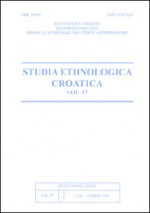Zvonimir Lovrenčević, začetnik etnomuzikologije i etnologije na bjelovarsko-bilogorskom području
Zvonimir Lovrenčević - The Founder of Ethnomusicology and Ethnology in the Region of Bjelovar and Bilogora
Author(s): Alida SokolovićSubject(s): Music, Recent History (1900 till today), Cultural Anthropology / Ethnology
Published by: Sveučilište u Zagrebu, Filozofski fakultet
Keywords: ethnography; musical folklore; Bilogora;
Summary/Abstract: A schoolteacher, Zvonimir Lovrenčević (1911-1990), was the first researcher of traditional culture in the region around the town of Bjelovar. His greatest contribution was the fact that he managed, in the middle of the 20th century, when reliable traces and narrations on traditional life could still be found, to salvage valuable data on traditional musical instruments, singing, customs and beliefs of the population of Bilogora region, which, in the meantime, have completely disappeared from the folk narratives. Therefore Lovrenčević's ethnographic writings represent the basis for all the future research of ethnomusicology and ethnology in the region of Bjelovar and Bilogora. Even-though he was the author of several ethnographical, historical and archaeological articles, the main area of his interest was ethnomusicology, primarily musical folklore, which was very popular in the middle of the 20th century. Lovrenčević wrote down notes and songs, described musical instruments and customs, but was less interested in the role music had in everyday life and the context of the performance itself. Many associates helped him with collecting the material, and since he had no ethnomusicological education, he got the expert help he needed in writing down melodies and in the analyses of the collected data, from his friend, the famous ethnomusicologist, Dr Jerko Bezić. This article specifically deals with Lovrenčevićís articles published on ethnomusicology, ethnology, and oral literature, and with his book, Folklore music of Bilogora (1994), which contains 115 melodies of folk songs. It also deals with several different articles on specific topics: Neobična svadba u Jabučeti (1963), Tambura samica u okolici Bjelovara (1963), Dvojnice i jedninka u bjelovarskoj okolici (1964), Bilje kojim se gata i vrača u okolici Bjelovara (1967), Dude u Bilogori (1971), Bilogorci u poslovicama (1971), Aerofoni instrumenti u Bilogori (1972), Mitoloöke predaje Bilogore (1972) i Ladarice (1979). Through research of available archives, I composed a bibliography of all Lovrenčevićís articles (scientific and newspaper articles, handwritten material) which is a supplement to this article. The work of Zvonimir Lovrenčević was very little written about until recently, and even-though his name was sometimes mentioned in relation to some of his melodies used by folklore groups in the region near the town of Bjelovar, his work remained without any recognizable purpose. Therefore the author of this article suggests that the results of Lovrenčević's research should be used in educational institutions of the region and in tourism. From the author's experience in working with the students of the Musical school in Bjelovar, she has noticed that teaching of folklore music, regardless the changed context of performance, can develop in students awareness of the value of traditional culture, while making of traditional musical instruments can develop their creativity. If learned craftsmen would take part in the making of more complex instruments, like dude, dvojnice and jedinke, the results of their work could be used in contemporary folklore performances. The forgotten musical instruments of Bilogora could also become original souvenirs of the region around the town of Bjelovar.
Journal: Studia ethnologica Croatica
- Issue Year: 2004
- Issue No: 16
- Page Range: 181-209
- Page Count: 29
- Language: Croatian

